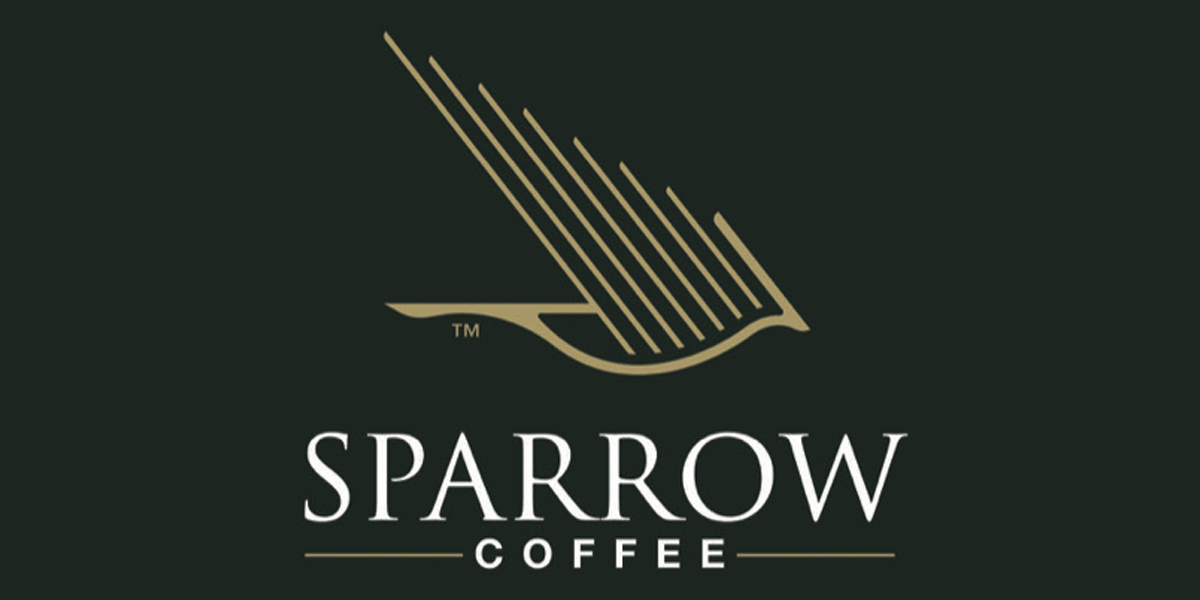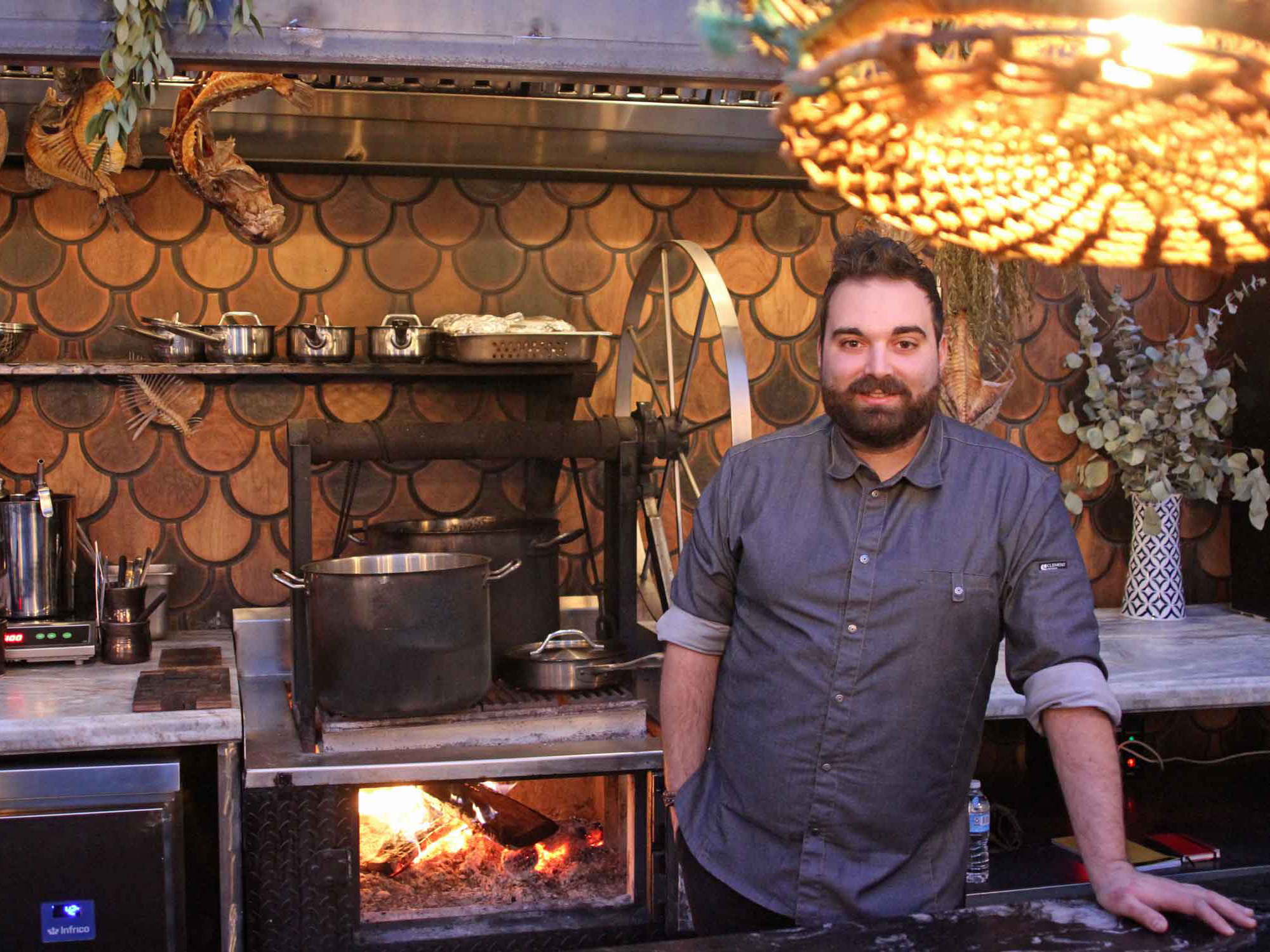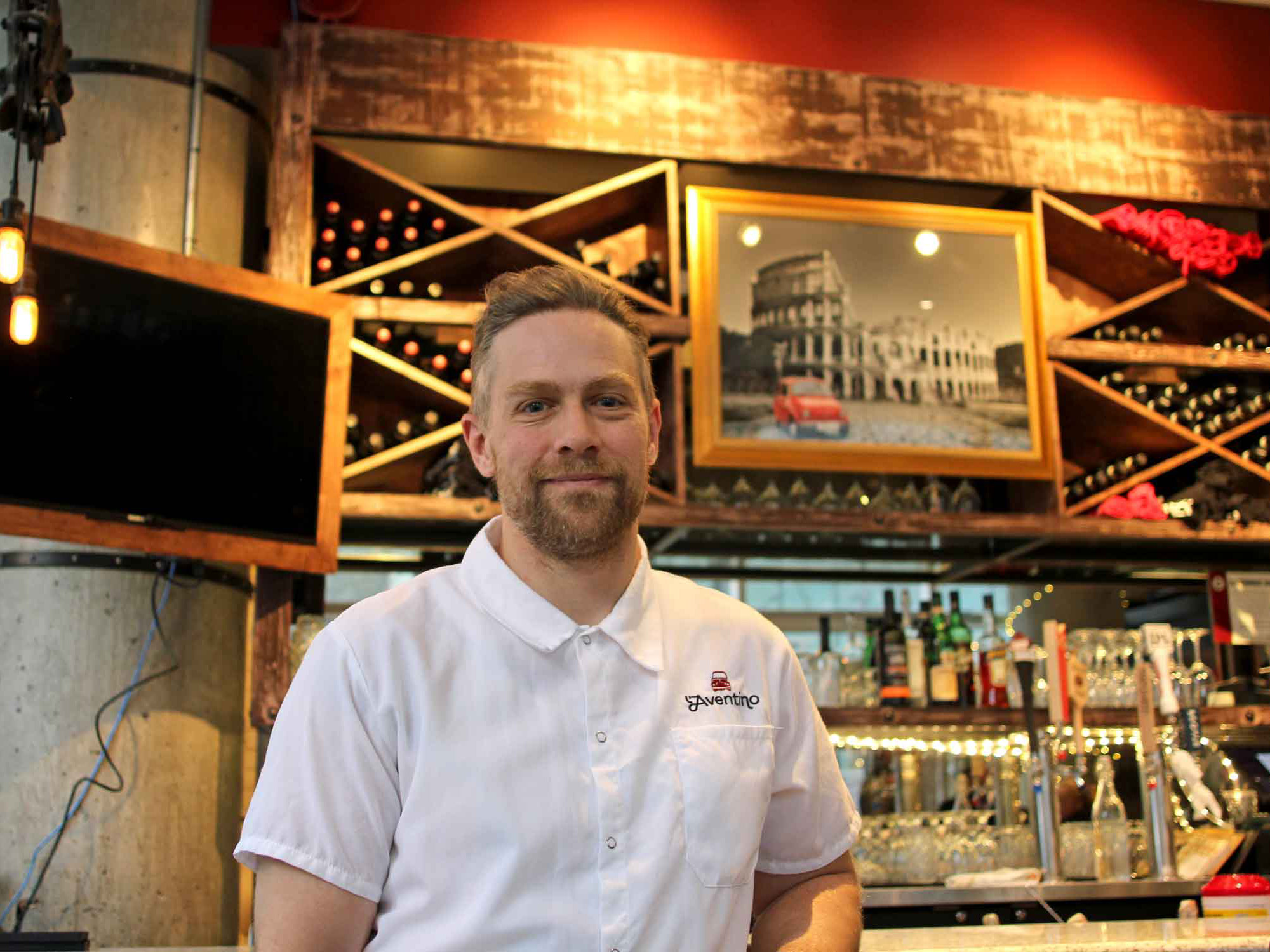“WE COME FROM ISTANBUL IN 2015,” Özkan Yilmaz says. “I win the green card in lottery. I come with my wife and two baggage, a little bit money, and one cat.”
This is how many immigrant restaurant stories in Chicago have always started, including the charmingly imperfect English. In some ways the story of Özkan and his wife Feyzan is pitch perfect immigrant Chicago—they came, they didn’t know anybody, they opened a restaurant catering to their fellow homelanders and their nostalgia for the real tastes of home, living in an apartment just steps from from the business. A sweet couple, with the guileless sincerity that was one of the things that struck me so strongly about Turkey, a place that the snarky cynicism of the West has not yet reached. As we talk at Turkitch in the quiet time between lunch and dinner, their little son Pars runs around the restaurant, Feyzan getting up to chase him. Someday he’ll look back at this place as where his parents worked hard to give him a life in America.
The typical immigrant restaurant story, except where it isn’t.
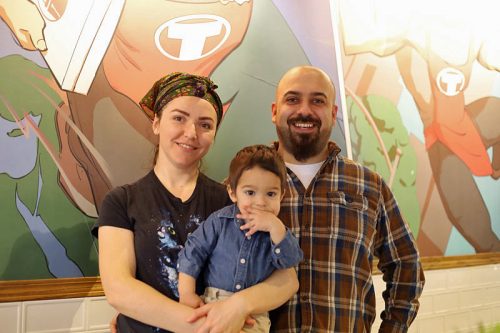
Feyzan, Pars, and Özkan Yilmaz
You might expect Özkan to have been a cook back in Istanbul. No, he was something that seems much more Western and modern—”I was a popular speaker in Turkey, about marketing, startup businesses, branding and project management. Speaking at universities, colleges, and companies.”
Turkey is a country full of hustle—you need a leather jacket? My friend’s shop has the best leather jackets—but it can be more sophisticated than just the exchange of favors and a little kickback for a referral. Özkan and Feyzan came to Milwaukee about three years ago—”I shoveled snow, drove Uber, worked in restaurant to learn and understand American life,” Özkan explains. “We watch a lot of Netflix, listening to music, talking with people to understand what they are talking about. We learned English like that.
“The first year was really tough. Because of the language barrier, and people don’t know who you are,” he says. But the opportunity they were waiting for was about to present itself, and Özkan’s background would enable him to make the most of it.
Feyzan was working as a pastry chef in a hotel in Milwaukee. “We started meeting people who missed the Turkish food, and said, ‘Make it for us,'” he says. They started with baklava—the honey and nut-filled pastry made with paper-thin layers of filo dough.
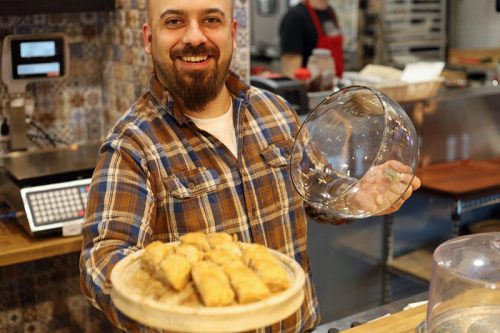
Have some baklava!
That seems a somewhat complicated thing for, basically, a home cook to make—or does everyone in Turkey know how to make it? “Most Turkish women know how to make the food,” Feyzan answers, and Özkan chimes in, “All Turkish women are great chefs!”
They made 50 or 60 orders of baklava and börek (a similar pastry filled with meat or cheese) for the local Turkish community, selling them at Turkish or middle eastern groceries in Milwaukee. The shop owners told them “You have to make prepackaged ones, with branding,” Özkan says.
He had the contacts back in Turkey to have baklava and börek made for him and shipped to America—not just a matter of convenience or lower costs; as Feyzan points out, “The flour is different, in Turkey and Anatolia, it’s 10% protein, but here only 4% protein. They have the same quality, same taste, as in Turkey, no added preservatives.”
And he had the brand name in mind—Turkitch, a contraction of Turkish and kitchen. From Uber driver and snow-shoveler, he was now ready to became an importer and marketer to the Turkish community in the midwest.
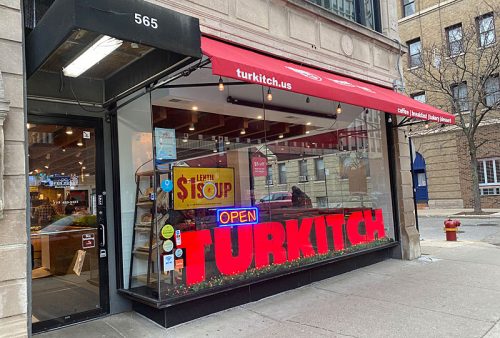
IT WAS A SIDE OF WHITE BEANS that first captivated me about Turkitch, the Yilmaz’s restaurant on Diversey east of Clark. Like so much food in Turkey, it’s not that it was complicated or clever—but it was simple, and clean-tasting, and guileless. It looked like what it was—piyaz, a simple, healthy-tasting salad of white beans with a little oil and sumac, as common as French fries here.
That straightforwardness is the common factor in Turkish cooking, which varies over a geographically diverse country. “In the north, people know fish and vegetarian cooking,” Özkan says. “On the Mediterranean and Asian side, it’s olive oil based.”
“If they have animal farms, they have to do kebabs,” Feyzan adds. “Turkish food is simple—we just choose the best ingredients.”
There are more sophisticated Turkish restaurants in the little Turkish enclave in Lakeview; there are also hole in the wall fast food spots. Turkitch is unique in that it has the kind of well-designed, bright fast food look of a Chipotle or Starbucks, a Western look, but at the same time, it combines simple Turkish dishes—chicken kebabs, patties of kofte—with a host of authentic products for sale. It feels a little like a cultural display for Turkey at a trade show.
“The good part of the Turkish concept, if you like the cheese, we’re selling it. If you like these olives, we’re selling these olives,” Feyzan says. “What we’re serving and eating in here, you should find here. We’re serving exactly what we are using in here.”
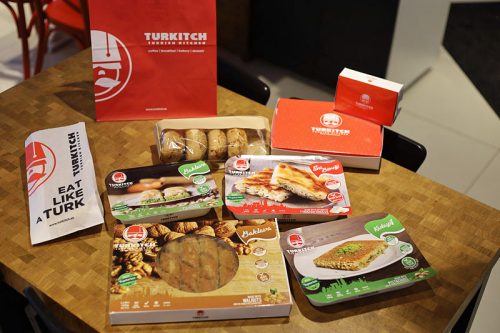
Turkitch prepackaged products
To open Turkitch, they moved from Milwaukee to Chicago—there’s a consulate here, and it’s sort of a natural center for Turks in the midwest. So everyone’s going to come here and eat and shop, in their view.
“Foods are really important for Turkish people,” Özkan says. “When we [started baking] Turkish bread, I made a focus group in the Milwaukee area, I posted on Facebook that we were going to have a meeting and ask you some questions, we will serve Turkish foods.” It turned out that their followers included more than their fellow Turks. “Indian people, French, German, Chinese people, everywhere they came from. We ask them, what does ‘Turkitch’ mean for you?”
In the focus group, one guy said, hashtag slogan, ‘Eat like a Turk.’ It means eat the Turkish foods, but you are sharing with friends.
Despite some actions of the present government in Turkey, the country’s overall reputation was positive among people of all different backgrounds—”Nice people, friendly, never fighting with [our country],” he says. He points to the logo—an Ottoman-era Turk with mustache and fez. “This focus group chose that guy with the fez on. Actually Turkish people don’t like the fez—it comes from Morocco, from the Ottoman times. It’s old fashioned for us. But for people from France or England, this means a Turkish gentleman.”
“One guy said, hashtag slogan, ‘Eat like a Turk.’ It means eat the Turkish foods, but you are sharing with friends.”
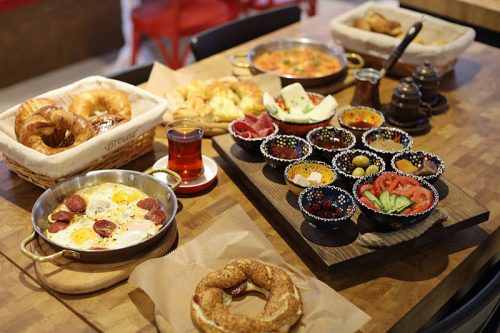
Turkish breakfast
This generosity comes out most on the weekend, when they serve Turkish breakfast—like a Swedish smorgasbord, a seemingly neverending feast of breads (such as simit, the Turkish version of a bagel), and platters of fried eggs and sujuk (sausage), and a host of snacks and spreads from jam to olives and cheese—plus, of course, Turkish coffee. It turns out that their restaurant changes with the rituals of Turkish breakfast.
“During the week, we serve for a lower price than most Turkish restaurants, and the time people spend eating is lower,” Özkan says. “But for Turkish breakfast, they stay two hours.” You can only change habits so much, it seems, when you invite someone to eat like a Turk.
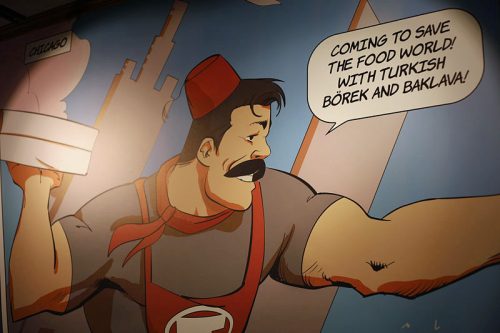
PARS IS TOSSING PACKETS OF TEA to his mom, the restaurant his playground, while I’m digging into a simit filled with melted cheese and sujuk, Turkish hard salami. Turkitch on Diversey seems a sunny, efficient concept ready to franchise, and Özkan says they already have lots of interest. But he’s not moving too quickly, letting the concept (still less than a year old) prove itself, perhaps mindful of the boom and bust that other aspiring chains from that part of the world or similar cuisines (Halal Guys, the Israeli Burger Im) have experienced.
He also points out that Turkitch, the brand, and Turkitch, the restaurant on Diversey, are not the same thing. “Turkitch is the brand. This concept is Turkitch Kitchen, a fast casual restaurant.” In fact, they have five concepts in total, three of which already have examples in Chicago. In the French Market downtown, they have Turkitch Plate—plates of ready-made food designed for quick service in an in-and-out lunchtime setting. In the Raffaello Hotel, they have Turkitch Cafe, which aims to offer Muslim travelers a halal choice for the coffee and pastry experience the rest of us travelers get at Starbucks.
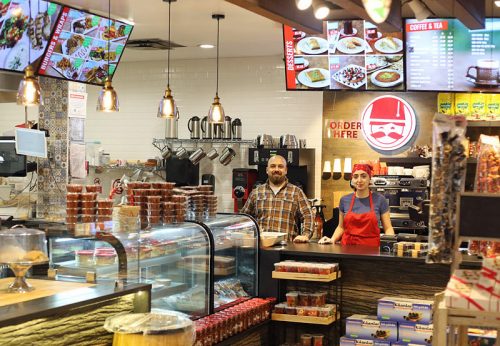
Beyond those, two more concepts are in the works—Turkitch Döner, which will offer döner kebab wraps, and Turkitch Flatbread, which will reflect the widespread culture of sort-of-like-pizza baking in Turkey. I ask why they didn’t do döner on Diversey—they have the kitchen space for it, surely. The answer is rather sweet. “There’s a guy down the street doing döner like you get in Germany,” Özkan says. Just because you plan to conquer America with Turkish food, doesn’t mean you want to be mean about it and take some other Turk’s livelihood away.
There’s plenty of room for plenty of ways to serve Turkish food in this country. “We are tracking which concepts will be good franchisee models” before they plan to expand, Özkan says. But expanding they most certainly will be. As Özkan says, “We started with working at the home. Second way was, we imported one pallet. Two months later, we imported three pallets. One year later, we imported one container, so 24 pallets. We’re doing this step by step, slowly—though I think it’s really fast.”
Michael Gebert is head fez of Fooditor.
Latest
Join the Discussion
After you comment, click Post. If you're not already logged in you will be asked to log in or register with Disqus.




